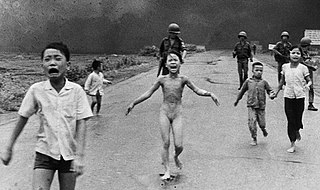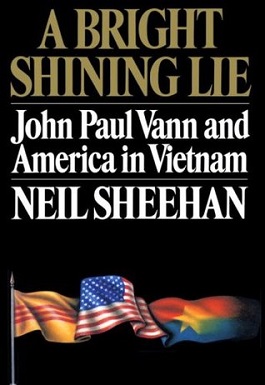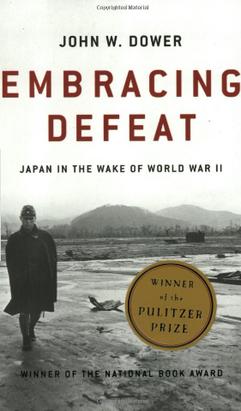
The Pulitzer Prize for General Nonfiction is one of the seven American Pulitzer Prizes that are awarded annually for the "Letters, Drama, and Music" category. The award is given to a nonfiction book written by an American author and published during the preceding calendar year that is ineligible for any other Pulitzer Prize. The Prize has been awarded since 1962; beginning in 1980, one to three finalists have been announced alongside the winner.

David Halberstam was an American writer, journalist, and historian, known for his work on the Vietnam War, politics, history, the Civil Rights Movement, business, media, American culture, Korean War, and later, sports journalism. He won a Pulitzer Prize for International Reporting in 1964. Halberstam was killed in a car crash in 2007 while doing research for a book.

Phan Thị Kim Phúc, referred to informally as the girl in the picture and the napalm girl, is a South Vietnamese-born Canadian woman best known as the nine-year-old child depicted in the Pulitzer Prize–winning photograph, titled The Terror of War, taken at Trảng Bàng during the Vietnam War on June 8, 1972.
Cornelius Mahoney Sheehan was an American journalist. As a reporter for The New York Times in 1971, Sheehan obtained the classified Pentagon Papers from Daniel Ellsberg. His series of articles revealed a secret United States Department of Defense history of the Vietnam War and led to a U.S. Supreme Court case, New York Times Co. v. United States, 403 U.S. 713 (1971), which invalidated the United States government's use of a restraining order to halt publication.
John W. Dower is an American author and historian. His 1999 book Embracing Defeat: Japan in the Wake of World War II won the U.S. National Book Award for Nonfiction, the Pulitzer Prize for General Nonfiction, the Bancroft Prize, the Los Angeles Times Book Prize, the Mark Lynton History Prize, and the John K. Fairbank Prize of the American Historical Association.

Frances FitzGerald is an American journalist and historian, who is primarily known for Fire in the Lake: The Vietnamese and the Americans in Vietnam (1972), an account of the Vietnam War. It was a bestseller that won the Pulitzer Prize, Bancroft Prize, and National Book Award.

A Bright Shining Lie: John Paul Vann and America in Vietnam (1988) is a book by Neil Sheehan, a former New York Times reporter, about U.S. Army lieutenant colonel John Paul Vann and the United States' involvement in the Vietnam War.

David Hume Kennerly is an American photographer. He won the 1972 Pulitzer Prize for Feature Photography for his portfolio of photographs of the Vietnam War, Cambodia, East Pakistani refugees near Calcutta, and the Ali-Frazier fight in Madison Square Garden. He has photographed every American president since Lyndon B Johnson. He is the first presidential scholar at the University of Arizona.
Desmond FitzGerald was an American intelligence officer for the Central Intelligence Agency (CIA), where he rose to the position of Deputy Director of Plans. He served in the CIA from 1950 until his death. Posthumously he was awarded the National Security Medal. An attorney, he had worked in New York City both before and after World War II. During the war, he was an Army officer, serving as liaison and adviser to the Chinese Army.
The following are the Pulitzer Prizes for 1964.
The following are the Pulitzer Prizes for 1973.

David Brion Davis was an American intellectual and cultural historian, and a leading authority on slavery and abolition in the Western world. He was a Sterling Professor of History at Yale University, and founder and director of Yale's Gilder Lehrman Center for the Study of Slavery, Resistance, and Abolition.

The involvement of the United States in the Vietnam War began in the 1950s and greatly escalated in 1965 until its withdrawal in 1973. The U.S. military presence in Vietnam peaked in April 1969, with 543,000 military personnel stationed in the country. By the end of the U.S. involvement, more than 3.1 million Americans had been stationed in Vietnam, and 58,279 had been killed.

Malcolm Wilde Browne was an American journalist and photographer, best known for his award-winning photograph of the self-immolation of Buddhist monk Thích Quảng Đức in 1963.
Children of Crisis is a social study of children in the United States written by child psychiatrist Robert Coles and published in five volumes by Little, Brown and Company between 1967 and 1977. In 2003, the publisher released a one-volume compilation of selections from the series with a new introduction by the author. Volumes 2 and 3 shared the 1973 Pulitzer Prize for General Nonfiction.

Embracing Defeat: Japan in the Wake of World War II is a history book written by John W. Dower and published by W. W. Norton & Company in 1999. The book covers the difficult social, economic, cultural and political situation of Japan in the aftermath of World War II and the nation's occupation by the Allies between August 1945 and April 1952, delving into topics such as the administration of Douglas MacArthur, the Tokyo war crimes trials, Hirohito's controversial Humanity Declaration and the drafting of the new Constitution of Japan.

Tôn Thất Thiện (1924–2014) was a South Vietnamese nationalist of the post-World War II generation who had the rare distinction of serving and watching at close quarters the two historic leaders of post-World War II Vietnam: presidents Ho Chi Minh in the Viet Minh coalition in 1945–46, and Ngô Đình Diệm 1954–55/1956–59/1963. He played a significant though understated role in the nationalist attempt to preserve a non-Communist Vietnam.

Tran Ngoc Châu was a Vietnamese soldier, civil administrator, politician, and later political prisoner, in the Republic of Vietnam until its demise with the Fall of Saigon in 1975.
The United Front for the Liberation of Oppressed Races waged a nearly three decade long insurgency against the governments of North and South Vietnam, and later the unified Socialist Republic of Vietnam. The FULRO insurgents represented the interests of indigenous Muslim and Hindu Cham, Montagnards, and Buddhist Khmer Krom against the ethnic Kinh Vietnamese. They were supported and equipped by China and Cambodia according to those countries' interests in the Indochina Wars.
Street without Joy is a 1961 book about the First Indochina War (1946–1954); it was revised in 1964. The author Bernard B. Fall was a French-American professor and journalist. He had been on-site as a French soldier, and then as an American war correspondent. The book gives a first-hand look at the French engagement, with an insider understanding of Vietnamese events, and provided insights into guerrilla warfare. It drew wide interest among Americans in the mid-1960s, when their own country markedly increased its activity in the Vietnam War.













